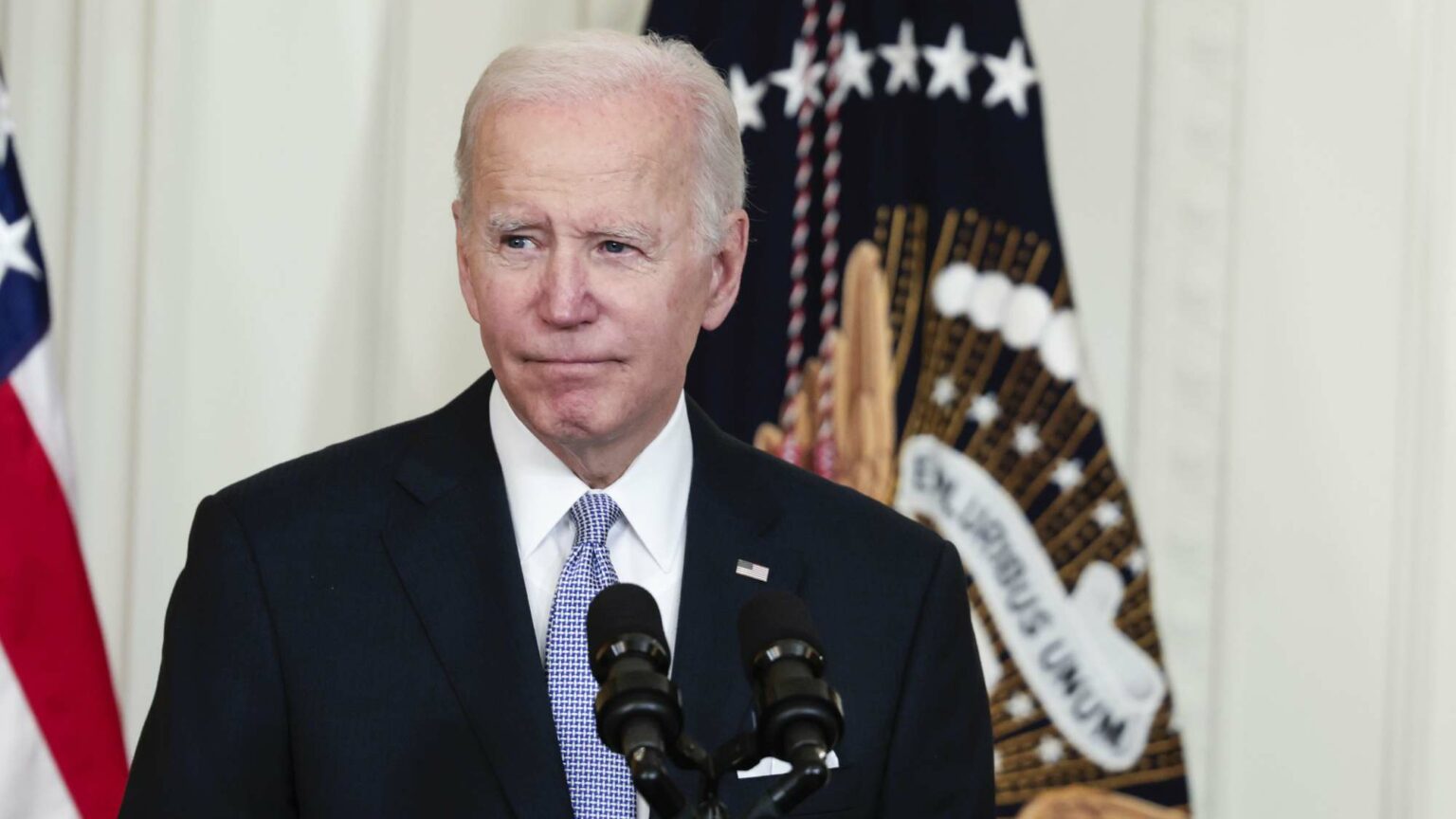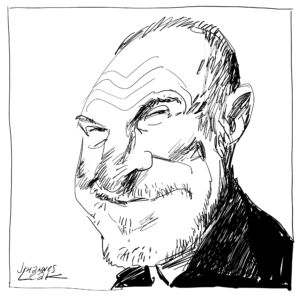Why Biden’s Ministry of Truth had to fail
‘Disinformation’ just means oppositional views and inconvenient truths.

Want to read spiked ad-free? Become a spiked supporter.
The question is, as so often, Quis custodiet ipsos custodes? Who will guard the guardians?
Just over a month ago, Nina Jankowicz was looking forward to being a pretty big deal on the custodes circuit. She was going to be heading the newly formed Disinformation Governance Board of the United States Department of Homeland Security. The front line in the War on Fibs. Her Mary Poppins incantation had worked!
Today, this bunk is history. The plug has been yanked – is that term ambivalent, when speaking of American politics? – pending review. Hmm, my hay fever is playing up again. Must be all that long grass.
And Nina Jankowicz has caught the first umbrella back out of DC, perhaps into the surely much more exciting world of musical theatre. Perhaps she could star in a Wicked for the world’s favourite Edwardian scold. Who wouldn’t want to see how Mary got to be so good?
‘The whole aim of practical politics’, wrote HL Mencken, ‘is to keep the populace alarmed (and hence clamorous to be led to safety) by an endless series of hobgoblins, most of them imaginary’. Mencken was right. And of this species of bogeyman, lies, propaganda and fake news were until recently looking very promising examples.
Joe Rogan and his ‘horse dewormer’ were road-tested as the prototype for this new breed of folk devil earlier this year. Rogan, they howled, was dripping poison – FDA-approved poison but still – into the ears of millions. Millions who should have been obediently arrayed like families of yore in front of the equally obedient network news channels. It didn’t work. Rogan shrugged, and their slugs slid off his mighty back like so many drops of homeopathic cold remedy.
But the powers that be were not to be thwarted so easily. If you thought the Military Industrial Complex was a threat to democracy, wait until you hear about the Media Academic Congressional Cathedral. Plenty of stained glass, too. Just don’t ask what with.
And so, in true McCarthyite style, they decided they needed a bureau.
‘Disinformation’ (or ‘misinformation’, a distinction as arcane as any that has divided the Eucharist these past 500 years) is a delicious reframing of oppositional views and inconvenient truths – not to mention of entire orders of conviction, hierarchies of belief and worldviews – as lies.
Rather than engage, rather than try, perhaps, to understand the locus and nature of the fundamental paradigm gap – the one that is germinating these pesky demands that we put religion or biology before individual self-expression, or keep our children away from experimental therapies – you can reject the entire thing as illegitimate. A tissue of huckster’s lies. Unworthy of argument, pathological and very possibly contagious. To be rooted out by professionals, in ideological hazmat suits, and tossed on to the smouldering autumn bonfire of history. And hence – the coup de grâce – a matter of national security.
Disinfo and misinfo, those two ugly sisters trying to present their own ugly feet as worthy of royal elevation, were portrayed by the Biden administration as the greatest threat facing national security since MAGA-hatted schoolboys, dwarfing climate change, nuclear war and even ‘1/6’ itself.
And yet before it could get its new Juggernaut of Truth on the road, let alone rev her up and start rolling over the ducklings of falsehood, the whole thing collapsed in a wheezing heap of its own internal contradictions.
Why? What happened? Was Jankowicz to blame?
A clue lies in Wikipedia, which quotes the DHS: ‘Nina Jankowicz has been subjected to unjustified and vile personal attacks and physical threats.’
This is the same familiar tactic Channel 4 used, to try to shield Cathy Newman from the tsunami of loud, derisive online laughter following her self-evisceration under the watchful, bemused gaze of Jordan Peterson a few years back. It certainly suggests that Jankowicz was indeed woefully inadequate to the task and was getting ribbed for it – hard. This, whether we like it or not, is internet-age democracy in action. And ugly as it is, like playground bullying, there is often some useful information being exchanged. The best headmas… sorry, headteachers have always understood this.
That Jankowicz was ill-suited – as ill-suited as a gorilla whose account with its tailor has been refused further credit and now has to shop at Sports Direct – should have been obvious to anyone with access even to that same Wikipedia page, let alone from the sort of background checks that would normally precede appointments to new flagship enterprises like the DGB.
True, Jankowicz had written a book called How to Lose the Information War: Russia, Fake News and the Future of Conflict, which suggests that she had familiarised herself with the basic drift, and indeed the Correct Takes.
But she had also been prominent among those pouring scorn on the notion that the New York Post’s Hunter Biden laptop story was anything more than a Moscow Meringue, a confection of Putin’s world-famous cyber-pastry chefs, whose creations have been the talk of Washington, DC for the best part of half a decade now.
The suppression of that story – now universally conceded to have been both valid and important – was itself probably the most egregious example of malicious, dishonest narrative-management during the last election cycle. Twitter’s suspension of the Post, in the run-up to the 2020 presidential election, was a disgrace. It still sticks in the craw of many of us who regard Trump’s claims of a ‘stolen’ election as a stain on the office he held. And no doubt it helped persuade millions to agree with him.
The fact that the Biden team did not regard this taint as disqualifying Nina J is at least as concerning as the fact that it wanted to create this Orwellian monster in the first place.
That this initiative was wrongheaded now seems to have been accepted by the present administration. But I want to argue that it was not just doomed on its own terms, but also symptomatic of a larger and more dangerous misunderstanding of the world as it is.
Information is universally agreed to be important. It is perhaps the most fiercely contested front – not just in the culture wars but also in the good old-fashioned civil war by other means that is a liberal democracy. And indeed, long before the notion of democracy had made the long journey from Periclean Athens to Pimlico and Penge, disinformation was weaponised by the actual cathedral, to shore up the legitimacy of kings and princes and wars.
The trouble is, no one can, or ever will be able to, agree just what it is. Yes, it is a fact that a terrible mass shooting occurred in Texas this week. Everyone can agree on that. And it will be helpful, going forward, to be able to distinguish truth from lies. But the truth is rarely pure, and never simple. And which facts deserve to be pooled in our assessment and understanding of that event will remain disputed as long as the case is remembered. The temptation to reject as ‘mis’ and ‘dis’ those which don’t fit, will never subside.
In every courtroom drama, from Sophocles to Sorkin, if the drama is to be sustained, it is the nature of information, of what matters, of what is true, that eludes us until the final reveal. When it comes, it is often in a dimension we had not previously imagined to exist. There is more psychological intelligence in Agatha Christie’s Witness for the Prosecution than there appears to be inside the entire Beltway.
One very strong work on the need for a good-faith understanding of different points of view, a book I never grow tired of recommending, is The Righteous Mind by Jonathan Haidt. And Haidt also co-authored The Coddling of the American Mind, which urges us to stop trying to protect our young people from sharp edges and bad news. The same danger, scaled up, is exactly what government needs to grasp. It is perhaps understandable, as you gaze down from Mount Olympus, to want your little people to stop playing with fire. But the more they are protected, the more their capacity for critical thinking will atrophy. Prepare the child for the road, not the road for the child. Take off those damned stabilisers and let them ride. Every grazed knee is a lesson.
And in the meantime, perhaps before we ask, who will guard the guardians, the first question should be: are we really sure we need guardians, for this, at all?
Simon Evans is a spiked columnist and stand-up comedian. He is currently on tour with his show, Work of the Devil. You can buy tickets here.
Picture by: Getty.
Who funds spiked? You do
We are funded by you. And in this era of cancel culture and advertiser boycotts, we rely on your donations more than ever. Seventy per cent of our revenue comes from our readers’ donations – the vast majority giving just £5 per month. If you make a regular donation – of £5 a month or £50 a year – you can become a and enjoy:
–Ad-free reading
–Exclusive events
–Access to our comments section
It’s the best way to keep spiked going – and growing. Thank you!











Comments
Want to join the conversation?
Only spiked supporters and patrons, who donate regularly to us, can comment on our articles.